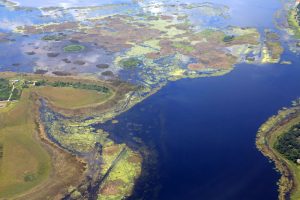
The first government assessment and response plan for algal blooms in Florida’s Everglades region would be undertaken under legislation recently introduced by U.S. Rep. Brian Mast (R-FL).
The National Centers for Coastal Ocean Science has researched and reported on harmful algal blooms in the Gulf of Mexico, the Great Lakes and the Mississippi River over the last 20 years under existing federal law — but no such research and reporting has been conducted in the Everglades.
“Considering the massive damage algal blooms have caused in our community, it’s ridiculous that a federal program specifically designed to combat algal blooms has never done an Everglades-specific analysis,” Mast said.
Mast’s bill, the South Florida Clean Coastal Waters Act, would direct a task force to explore consequences, causes and strategies to reduce algal blooms in the Greater Everglades region. The task force would then report to Congress on how to reduce, mitigate and control the algal blooms.
“This bill is a critical first step to developing a comprehensive plan that forces the state and federal government to work together to keep our water clean,” he said.
Mass also recently introduced legislation that aims to spur the development of technology to address algal blooms, which can contain toxins that harm marine life and humans. The Harmful Algal Blooms Solutions Act would create a competitive program that rewards the developers of safe, innovative solutions with financial prizes.
“When I talk to experts about the challenges of cleaning up harmful algal blooms, one of the most frequent roadblocks I hear about is the difficulty in scaling technology to the size needed to clean huge bodies of water,” Mast said in August. “This new program would go a long way toward improving the type of technology that cleans algae out of fish tanks to be able to keep our rivers clean.”



